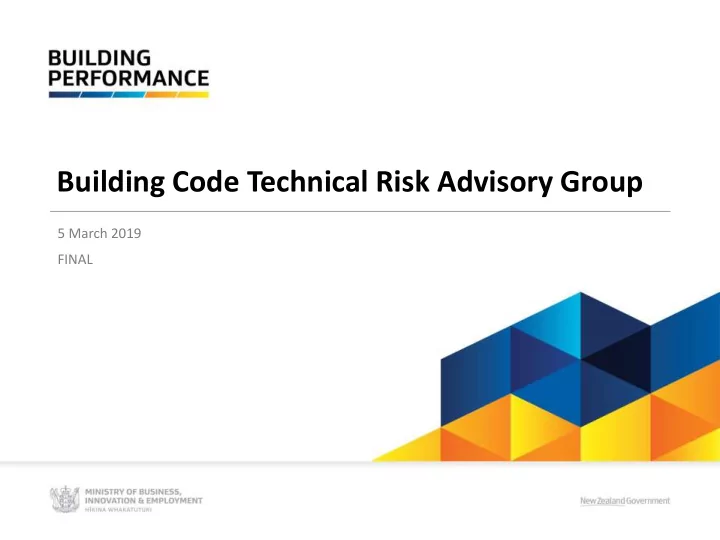

Building Code Technical Risk Advisory Group 5 March 2019 FINAL
Agenda Item Agenda Item In the hands of Time Welcome Coffee 9:15 - 9:30 Introductions 1. Endorsement of the: Mike Kerr 9.30 - 9.45 • Function of the Group • Definition of Technical Risk 2. Business Update Dave Robson 9.45 - 10.15 Katrina 3. Update on the Building System Legislative Reform Programme 10.15 – 10.45 Quickenden
Agenda Item Agenda Item In the hands of Time 10.45-10.55 Open Forum: Discuss Risks: • Risk 1: Use of Cross Laminated Timber (CLT) in buildings. 10.55-11.05 • Risk 2: Compliance pathway for Buckling Resistance Bracing 4 Mike Kerr use of which is becoming more prevalent in construction • Risk 3: Raised Access Floors (RAFs) with no Seismic Bracing 11.05-11.15 • Risk 4: 1170 Structural seismic design 11.15-12.15 Lunch Open Forum: Discuss Risks: 12.45-1.15 • Risk 5: Post-event Business Continuity Planning, functionality, damage control, and building reparability. 4. Mike Kerr • Risk 6: Data is not being collected regarding performance to allow compliance assessments and identify areas of best 1.15-1.45 practice and concern. 5. Open Forum: General issues Mike Kerr 1.45 - 2.15 6. Next Steps Mike Kerr 2.15 – 2.30
1. Endorsement – Function of the BCTRAG Function of the Group: The BCTRAG will identify and assess technical risks and opportunities within the Building Code* focusing on: • Ensuring the Building Code System remains fit for purpose. • Providing clarity on performance requirements between the sector and the regulator. • Solutions that enable innovation. • Advice on the wider impacts of regulatory changes. * The Building Code is comprised of the 41 Technical Clauses and their supporting Acceptable Solutions and Verification methods
1. Endorsement – Definition of Technical Risk Technical Risk is defined as: • Technical building performance risks or events with sector implications. • Emerging opportunities to improve or innovate within the Building Code System that require a technical change. • Inappropriate existing technical performance settings or compliance pathways. • Recent NZ or Global events with a technical building performance impact.
2. Business Update - Building Code Delivery Framework • The way the Building Code is managed is changing to keep it up to date, set clear performance requirements, and allow for sector innovation and best practice. • The Building Code Delivery Framework has 4 pillars of success: o Strategic panning o 360 relationships o Knowledgeable participants o Maintained as fit for purpose
2. Business Update - Building Code Delivery Framework • The delivery framework contains seven initiatives. These include: o Biannual Building Code updates will give confidence of ongoing development and clarity around timing for the sector. The HD8 initiative has placed first priority on making changes to eight Building Code clauses which will best support a shift to higher density housing. o Sector representatives in the Building Code Technical Risk Advisory Group (BCTRAG) provide advice on technical risks and opportunities in the Building Code to inform the work programme and strategic direction. o Developing a Risk Framework for the Building Code to target the right risks and opportunities. o Educating users on the Building Code and collaborating with Engineering NZ for technical expertise and strong relationships. o A long term Improvement Strategy of 10+ years which will set out to improve the Building Code, including its 41 clauses
3. Update on the Building System Legislative Reform Programme
4. Risks Discussions • Structure of discussion: 1. Perspectives that add clarity to the risk 2. How wide spread is this risk 3. Who and / or what will be impacted by its occurrence 4. If this risk is addressed should it be in the a) short term (commence in the next 6 months) b) Medium term (commence in the next 9 months) c) Long term (commence in over a year) 5. Recommendations on how to address or quantify this risk. 6. Summary of discussion and conclusion
Lunch
5. Open Forum: General issues
6. Next Steps • Next meeting will be on Wednesday 06 June, 2019 at MBIE. o Should the meeting duration be extended o Senior Geotechnical Engineer, MBIE will present on existing projects • Questions
Thank You
Recommend
More recommend